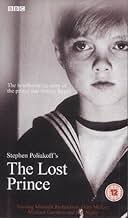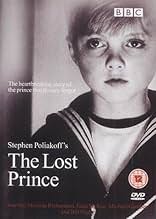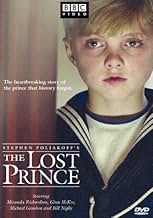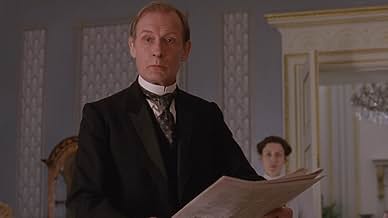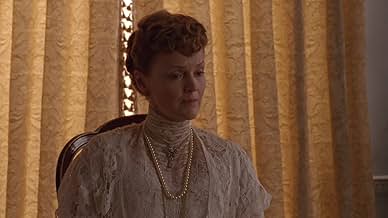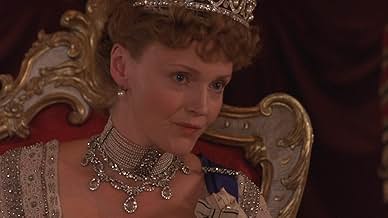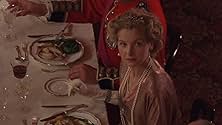NOTE IMDb
7,6/10
2,2 k
MA NOTE
Ajouter une intrigue dans votre langueThe story of Prince John, the autistic and epileptic youngest son of Queen Mary and King George V, who spent his whole life hidden away from public view and died at the age of 13 in 1919.The story of Prince John, the autistic and epileptic youngest son of Queen Mary and King George V, who spent his whole life hidden away from public view and died at the age of 13 in 1919.The story of Prince John, the autistic and epileptic youngest son of Queen Mary and King George V, who spent his whole life hidden away from public view and died at the age of 13 in 1919.
- Récompensé par 3 Primetime Emmys
- 8 victoires et 21 nominations au total
Avis à la une
I was very much moved by this movie about the youngest child of King George V (1911-1936) and Queen Mary. The young Prince John was largely kept out of the public eye because he was thought to be an embarrassment to the Royal Family.
The Prince was diagnosed with epilepsy by his doctors and because of this and his learning disabilities, he was dismissed by both doctors and teachers as a child with little potential and a liability to the Royal Family. In fact, the young Prince was capable of learning as his governess, played by Gina McKee, was able to prove. It is quite likely that he had autism, a condition that makes social interaction difficult but is not a sign of low intelligence. In fact, with proper guidance and some understanding, he was shown to have exceptional talent, not unusual with autism.
The Prince was used to spending much of his time at Sandringham, the royal estate in Norfolk and home of his grandmother Queen Alexandra, which was where he enjoyed his own private garden. He also had a strong friendship with his slightly older brother Prince George, later the Duke of Kent. This is interesting because George was something of a pariah himself as a young man but later became an important working royal with his wife Marina and their children by his side.
What I found most unsettling was the distance between John and his parents George V and Queen Mary. The King and Queen performed their official roles very well but ran a tight ship, which put a lot of pressure on their children. Whether true to life or not, King George is shown as a high strung monarch, who was incapable of acting naturally with his youngest son, to the point of unleashing outbursts of anger towards John. John's grandfather Edward VII showed far more understanding of John but he died when John was only five. One can imagine that life with the grandparents - Edward VII and Queen Alexandra - would have allowed John an easier childhood.
Queen Mary, a tower of strength to the the Royal Family for almost 60 years, seemed incapable of showing any personal affection. When tears welled up in her eyes, you could see her sorrow but she was incapable of hugging him or speaking to him as a loving mother. Queen Mary felt constrained by her role. She showed anger towards the governess whenever John without warning, appeared in front of the public or government officials. In fact, as governess, it was Gina McKee who showed great understanding and took great pride in young John's progress.
The movie seems to have a layer of truth as the story of a special needs child, who is subjected to pressures and misunderstandings as a member of the Royal Family. This is the flip side of the life of privilege. The one bright light in his short life was his governess who was able to draw out his overlooked talents and impart to him some measure of happiness despite his imposed seclusion.
The Prince was diagnosed with epilepsy by his doctors and because of this and his learning disabilities, he was dismissed by both doctors and teachers as a child with little potential and a liability to the Royal Family. In fact, the young Prince was capable of learning as his governess, played by Gina McKee, was able to prove. It is quite likely that he had autism, a condition that makes social interaction difficult but is not a sign of low intelligence. In fact, with proper guidance and some understanding, he was shown to have exceptional talent, not unusual with autism.
The Prince was used to spending much of his time at Sandringham, the royal estate in Norfolk and home of his grandmother Queen Alexandra, which was where he enjoyed his own private garden. He also had a strong friendship with his slightly older brother Prince George, later the Duke of Kent. This is interesting because George was something of a pariah himself as a young man but later became an important working royal with his wife Marina and their children by his side.
What I found most unsettling was the distance between John and his parents George V and Queen Mary. The King and Queen performed their official roles very well but ran a tight ship, which put a lot of pressure on their children. Whether true to life or not, King George is shown as a high strung monarch, who was incapable of acting naturally with his youngest son, to the point of unleashing outbursts of anger towards John. John's grandfather Edward VII showed far more understanding of John but he died when John was only five. One can imagine that life with the grandparents - Edward VII and Queen Alexandra - would have allowed John an easier childhood.
Queen Mary, a tower of strength to the the Royal Family for almost 60 years, seemed incapable of showing any personal affection. When tears welled up in her eyes, you could see her sorrow but she was incapable of hugging him or speaking to him as a loving mother. Queen Mary felt constrained by her role. She showed anger towards the governess whenever John without warning, appeared in front of the public or government officials. In fact, as governess, it was Gina McKee who showed great understanding and took great pride in young John's progress.
The movie seems to have a layer of truth as the story of a special needs child, who is subjected to pressures and misunderstandings as a member of the Royal Family. This is the flip side of the life of privilege. The one bright light in his short life was his governess who was able to draw out his overlooked talents and impart to him some measure of happiness despite his imposed seclusion.
Stephen Poliakoff wrote and directed this which was shown over two weekends recently here in the UK. It was certainly a sumptuous production, I've rarely seen a costume drama more lavishly dressed.
It is broadly about the period 1908 to about 1920 seen through the eyes of the little known Prince John, youngest son of King George V and Queen Mary. Possibly autistic or with milder learning difficulties and known to be epileptic, this play shows his child's eye views of his grandfather the King (Edward VII) and the visit of the Tzar to the UK, following on to his own father's succession, through the Irish crisis and on to the the First World War. His father becomes King and he is packed off to the country, as his shortcomings emerge, with his faithful nurse Lala with only occasional visits from the aloof Queen Mary his mother, who just cannot understand him or his needs. His brother George, very bright and determined, is used as a foil to explain a lot of action as is the King's Secretary, Lord Stamfordham.
Miranda Richardson is superb as Queen Mary, catching her regality and vunerability in one, though Tom Hollander did less well as the King, he was a little young, the King being in his late forties/early fifties during this time, and Michael Gambon, a Poliakoff favourite (and the new Dumbledore apparently) does little more than a cameo as Edward VII. Gina McKee excels as Lala, determined to make Johnnie's parents just even notice him.
The King and Queen are here portrayed much younger than the geriatrics they are usually seen as in Abdication dramas. Great stuff!
And what became of them all, well you'll have to watch but Prince George became the Duke of Kent and was killed in an RAF aircrash in 1942, George V died in 1936 and Queen Mary died in 1953, the year Johnnie's niece, Elizabeth was crowned.
It is broadly about the period 1908 to about 1920 seen through the eyes of the little known Prince John, youngest son of King George V and Queen Mary. Possibly autistic or with milder learning difficulties and known to be epileptic, this play shows his child's eye views of his grandfather the King (Edward VII) and the visit of the Tzar to the UK, following on to his own father's succession, through the Irish crisis and on to the the First World War. His father becomes King and he is packed off to the country, as his shortcomings emerge, with his faithful nurse Lala with only occasional visits from the aloof Queen Mary his mother, who just cannot understand him or his needs. His brother George, very bright and determined, is used as a foil to explain a lot of action as is the King's Secretary, Lord Stamfordham.
Miranda Richardson is superb as Queen Mary, catching her regality and vunerability in one, though Tom Hollander did less well as the King, he was a little young, the King being in his late forties/early fifties during this time, and Michael Gambon, a Poliakoff favourite (and the new Dumbledore apparently) does little more than a cameo as Edward VII. Gina McKee excels as Lala, determined to make Johnnie's parents just even notice him.
The King and Queen are here portrayed much younger than the geriatrics they are usually seen as in Abdication dramas. Great stuff!
And what became of them all, well you'll have to watch but Prince George became the Duke of Kent and was killed in an RAF aircrash in 1942, George V died in 1936 and Queen Mary died in 1953, the year Johnnie's niece, Elizabeth was crowned.
10kos5
The Lost Prince is one of those wonderful pieces that you rarely see. Beautiful, touching, moving, and heartbreaking are only a few words to describe it. It was informative also because I had never before known of the epileptic Prince John. I fell in love with Johnny the first time I saw him.
The acting was fantastic. I loved Lalla. Gina Mckee did an excellent job in portraying her. Miranda Richardson(Queen Mary) also did a wonderful bit of acting as the seemingly heartless Queen. I was reduced to tears at the end.
If you've never heard of the wonderful little Prince, or you'd just like to watch a different perspective on the Royal family, see the The Lost Prince, you'll be glad you did.
The acting was fantastic. I loved Lalla. Gina Mckee did an excellent job in portraying her. Miranda Richardson(Queen Mary) also did a wonderful bit of acting as the seemingly heartless Queen. I was reduced to tears at the end.
If you've never heard of the wonderful little Prince, or you'd just like to watch a different perspective on the Royal family, see the The Lost Prince, you'll be glad you did.
(Aired over two nights this week on the Canadian station, CBUT, which we get here in Seattle...)
Superbly photographed and exquisitely acted, this movie primarily focuses on England's Prince John, youngest son of George V and Queen Mary who, in his tragically short life, suffered not only from periodic epileptic seizures but was also handicapped by what appeared to be some form of retarded mental development.
The creators of this film were kindly and charitable in not showing the boy's ailments in too negative a light. Enough was shown though to give the viewer to understand that the poor lad had problems - so much so that his immediate family and caretakers felt that he clearly wasn't cut out for royal service. As a result he was whisked away to a sort of royal "nether-world" out in the English countryside, away from public view, where hopefully he would not become an object of curiosity, scorn, ridicule, etc.
Sad though the plight of the boy was, you couldn't help but feel that he and his dysfunctional condition was a metaphor for the plight of the entire royal or aristocratic system which held sway over most all of Europe at the time. The boy's ailments and weaknesses eventually lead to his downfall, and all of this plays out simultaneously with the royal families of Europe (most of whom are shown being connected through marriage or bloodline) attempting to cope quite ineffectually with the onslaught of the tragedy of World War One.
The film includes several scenes of interaction between the British royal family and the Russian royal family (the Czar and Czarina and their wonderful kids). They are closely related, which makes their death (or shall we say murder, at the hands of the Bolsheviks, which is graphically depicted) all the more chilling, tragic and thought provoking.
There is so much to contemplate in this movie that I'd rather not sit here and prattle on about it, but instead would rather simply recommend that people go rent a copy and just watch it. It may not be for everyone, as it is a bit long and covers many facets of early 20th century history that will glide right over your head if you weren't paying attention in history class. But even if you ignore entirely the historical aspects of the movie, it is nonetheless a very touching picture: sad, compelling, and ultimately life-affirming, with wonderful performances and beautifully photographed images that will stick in your mind for a long time to come.
Superbly photographed and exquisitely acted, this movie primarily focuses on England's Prince John, youngest son of George V and Queen Mary who, in his tragically short life, suffered not only from periodic epileptic seizures but was also handicapped by what appeared to be some form of retarded mental development.
The creators of this film were kindly and charitable in not showing the boy's ailments in too negative a light. Enough was shown though to give the viewer to understand that the poor lad had problems - so much so that his immediate family and caretakers felt that he clearly wasn't cut out for royal service. As a result he was whisked away to a sort of royal "nether-world" out in the English countryside, away from public view, where hopefully he would not become an object of curiosity, scorn, ridicule, etc.
Sad though the plight of the boy was, you couldn't help but feel that he and his dysfunctional condition was a metaphor for the plight of the entire royal or aristocratic system which held sway over most all of Europe at the time. The boy's ailments and weaknesses eventually lead to his downfall, and all of this plays out simultaneously with the royal families of Europe (most of whom are shown being connected through marriage or bloodline) attempting to cope quite ineffectually with the onslaught of the tragedy of World War One.
The film includes several scenes of interaction between the British royal family and the Russian royal family (the Czar and Czarina and their wonderful kids). They are closely related, which makes their death (or shall we say murder, at the hands of the Bolsheviks, which is graphically depicted) all the more chilling, tragic and thought provoking.
There is so much to contemplate in this movie that I'd rather not sit here and prattle on about it, but instead would rather simply recommend that people go rent a copy and just watch it. It may not be for everyone, as it is a bit long and covers many facets of early 20th century history that will glide right over your head if you weren't paying attention in history class. But even if you ignore entirely the historical aspects of the movie, it is nonetheless a very touching picture: sad, compelling, and ultimately life-affirming, with wonderful performances and beautifully photographed images that will stick in your mind for a long time to come.
This lavish production, uses the vehicle of the short life "The Lost (from history) Prince" to portray what Royal Life was like at the turn of century. The sumptuous production illustrates the splendour, luxury, misery and ultimately the futility of the Royals. There are wonderful images of the beautiful daughters of the tsar. Epileptic Prince John is however seen as the only one as being allowed to be himself. Wonderful performances of the roles of the ice queen Queen Mary, Lalla the nursemaid, Prince John young and old.Has been criticised for being too long, but you must try and get to see this when it comes to your country.
Historical facts, Prince John died aged 14 isolated from his family in a farmhouse at Sandringham? cared for by Lalla Bill. Only one historical reference to him still existed. The height of George V is still a secret.
Historical facts, Prince John died aged 14 isolated from his family in a farmhouse at Sandringham? cared for by Lalla Bill. Only one historical reference to him still existed. The height of George V is still a secret.
Le saviez-vous
- AnecdotesThe character Prince John is autistic.
- GaffesWhen the Romanovs are in England, Alexandra speaks English with a Russian accent. In real life, Alexandra was a German princess raised in England by her grandmother, Queen Victoria. She spoke English with a British accent.
- Citations
Prince George: [Speaking about Prince John] He was the only one of us who was able to be himself.
- ConnexionsFeatured in Masterpiece Theatre: The Lost Prince: Part 1 (2004)
- Bandes originalesRondo for Glass Armonica
(uncredited)
Composed by Joseph Schmittbauer (as J.A. Schmittbauer)
(Queen Alexandra's birthday cake)
Meilleurs choix
Connectez-vous pour évaluer et suivre la liste de favoris afin de recevoir des recommandations personnalisées
Détails
- Date de sortie
- Pays d’origine
- Sites officiels
- Langue
- Aussi connu sous le nom de
- 失落的王子
- Lieux de tournage
- Black Park Country Park, Black Park Road, Wexham, Buckinghamshire, Angleterre, Royaume-Uni(Russian lake, royal car)
- Sociétés de production
- Voir plus de crédits d'entreprise sur IMDbPro
Contribuer à cette page
Suggérer une modification ou ajouter du contenu manquant

Lacune principale
By what name was The Lost Prince (2003) officially released in India in English?
Répondre
